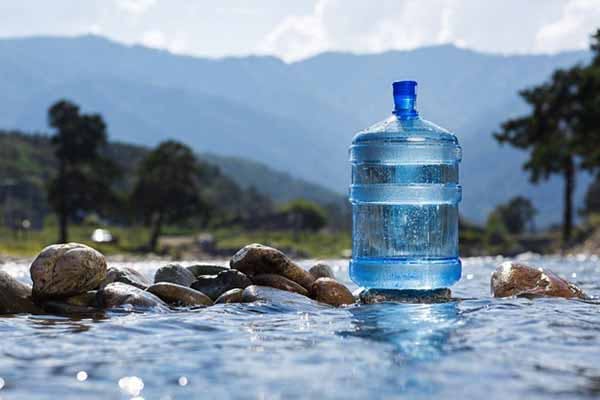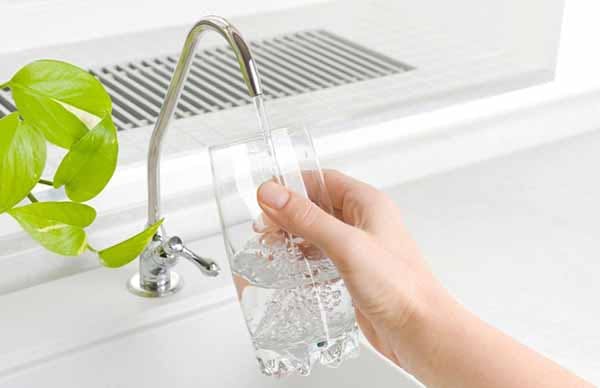April 2022
Cost of Bottled Water: Why Is It So Expensive?
Bottled water is big business in the United States and it’s no wonder — the cost of bottled water is shockingly high. Just how much does bottled water cost, exactly? As you’ll see, the price of bottled water varies depending on a number of factors.
There was a time when purchasing water was still a strange idea. Unlike other parts of the world, U.S. residents have long enjoyed clean tap water right in their homes. Now, many choose to buy bottled water, despite the expense.
Trademarked brands like Poland Spring, Pure Life, and Aquafina helped sales volume grow by 5% in 2021. Commercially sold bottled water is currently the number-one selling beverage by volume. But how did bottled water go from a novel idea to one of the most significant segments in the beverage industry?
This article discusses the cost of bottled water versus tap water or filtered tap water, and why avoiding plain tap water — even at the expense of bottled water or a water filtration system — is a good idea.
How Much Does Bottled Water Cost?
The average price of bottled water varies by brand, type, and region. Let's look at bottled water in one metropolitan area. At a local Walmart in Milwaukee, a gallon (128 fl oz bottle) of Great Value Purified Drinking Water costs $1.08 per gallon; that price is lower than one gallon of Crystal Geyser Alpine Spring Water, which costs $1.38 and is from the same retailer.
Larger bottles of water typically cost less per ounce. You'll likely pay similar prices for a smaller, 16 oz bottle at a convenience store. Some consumers also save money by buying bottled water in bulk. Later we’ll look at how these prices compare to using a water filter and tap water.
Why Is Bottled Water So Expensive?
Many people wonder why bottled water costs so much more than tap water. The price has less to do with the water itself and more to do with business expenses. The associated costs are high when you factor in the manufacturing, transportation, and advertising costs of producing each bottle. Many bottled water plants that sell purified water use the same water source as local water utility companies.
Bottled water manufacturers must purchase the water, buy the plastic water bottles, and pay employees to get the water in those bottles. Then companies incur even more costs to transport those heavy plastic bottles filled with water to a store near you. Retailers then add a markup too.
On top of that, bottled water brands then spend millions more on marketing strategies to get people to choose their water over the competition. Those additional expenses add up quickly, and companies pass these costs onto the consumer. So when you pick a bottle of water off the shelf at your store, you’re paying for far more than just water.
The Environmental Impact of Bottled Water
Bottled water isn't just hard on your wallet. There’s a severe environmental impact associated with bottled water. Unfortunately, most plastic bottles used in the U.S. end up in landfills; in fact, just under one-third of plastic bottles are recycled.
This plastic waste ends up in the trash and pollutes our waterways. Plastic accounts for 80% of all marine debris. You can go easy on your budget and the planet by using a home purifier and a reusable water bottle.
A History of Bottled Water in the U.S.
Some companies bottled and sold mineral water as early as the 1850s. Sellers operated under the guise of unsubstantiated health benefits, like relief from "liver and kidney complaints." Bottled water sales also thrived in urban areas where public drinking water could be contaminated. But bottled water consumption plummeted when modern chlorination processes ensured clean tap water. By the 1970s, most packaged water sold was 5-gallon jugs used in office water coolers.
Then came the health and fitness craze of the late 1970s and early 1980s. Some consumers were drinking less alcohol but still craved a sophisticated beverage. Sales of Perrier, a carbonated water brand, boomed during this time. Other beverage brands saw a business opportunity. They wanted in on the growing bottled water consumption. Today, an Amazon search for "bottled water" brings up over 400 results.
Consumers now reach for bottled water as an alternative to calorie-laden sodas and energy drinks. There are many options: Buyers now have their pick from purified water, spring water, mineral water, alkaline water, and flavored water. They drink bottled water for its convenience, taste, and health benefits.
Where Does Bottled Water Come From?
In the U.S., the FDA regulates bottled water production. The agency requires manufacturers to keep their water sources free of contaminants and maintain Current Good Manufacturing Practices (CGMPs) throughout the bottling process.
Some brands obtain their water from specialty locations. For example, Evian collects its mineral water from a spring in the French Alps. But brands that sell purified water often obtain their product from public sources, just like the tap water in your home. Dasani bottles water from the "local water supply" and purifies it via reverse osmosis.
How Much Do Under Sink Water Filters Cost?
While bottled water costs may not seem high compared to other drinks like soda, bottled water is shockingly expensive compared to tap water. So why do people still opt for bottled water? Usually, the decision comes down to smell, taste, and purity, as many consumers prefer bottled water's consistent flavor and quality.
The Environmental Protection Agency (EPA) oversees public water sources, like the tap water in your home. The agency enforces guidelines to keep your water safe and free of harmful contaminants. However, the EPA doesn’t regulate certain substances that aren’t “considered to present a risk to human health.” These substances can cause safe water to have an off-putting odor or appearance. Many households use water filters to save money and purify their home's tap water.
One cost-effective alternative to bottled water is an under counter water filtration system. These filters remove the impurities that cause discoloration and bad smells in tap water while providing consistently clean, great-tasting water at a fraction of the cost. These low-cost filters can save families hundreds of dollars annually in bottled water costs alone.
How Much Does Tap Water Cost?
In the U.S., a gallon of tap water will cost you less than a penny. The exact cost of water will vary depending on where you live, the total amount of water consumed, and your water source.
Typical tap water sources include lakes, rivers, aquifers, aqueducts, and reservoirs.
Water utility companies take water from these sources, treat it, and distribute it to homes and businesses. Water utility companies track individual usage with water meters, which record how many gallons consumers use each month. Your monthly water bill factors in the cost of the water along with additional fees, labor, and the infrastructure it costs to provide water. The cost of tap water is astonishingly low when you consider how much effort and resources it takes to get to your home.
Which Is Cheaper, Bottled Water or Filtered Tap Water?
Even when you factor in the initial purchase of a water purifier and the cost of replacement filters, it’s still cheaper to drink tap water. However, you may not realize just how much you save over the cost of bottled water.
Earlier, we covered the price of bottled water in Milwaukee, which can range from $1.08 to $1.38 a gallon. That doesn't sound like much money compared to the average cost of other bottled beverages like juices, sodas, and beer. But Milwaukee residents who drink tap water only pay about $0.01 for 3 gallons of tap water! That's right; it costs residents less than a penny to drink an entire gallon of water from their kitchen tap.
Let's make a quick comparison:
- Say you pay a one-time upfront cost of $150 for an under counter filtration system, plus a subscription cost of approximately $64 every three months for replacement filters. The total cost would be about $406 the first year and around $256 per year after that.
- One gallon of bottled drinking water (average $1.23 per gallon) per day for a two-person household would cost about $449 per year. Considering a half-gallon of water per person each day is below the suggested daily consumption amount for most people, which varies by weight, this estimate is on the low side.
Can Choosing to use Water Filters Save Money?
Water quality is essential. Most people won't drink water that doesn't taste or smell good. A water filter can help you meet your daily hydration goals. You'll find that drinking enough water can alleviate mild dehydration symptoms like a headache and cravings for salty foods.
If your monthly water budget includes purchasing expensive bottled water, then filtering your home's tap water could help save you hundreds of dollars.
Cost-saving filters can transform ordinary tap water and make it taste as good as, if not better than, store-bought bottled water at a fraction of the cost.
Is It Better to Drink Filtered Tap Water or Bottled Water?
Choosing between filtered tap water and bottled water is easy from a financial standpoint. Compared to bottled water, filtered tap water will cost you pennies on the dollar. And with the right reusable water bottle, it can be just as convenient, cold, and great-tasting as your favorite bottled water brand.
What Are Some Advantages of an Under Sink Water Filter?
If you consider a water filter for your home, then an under sink unit is smart. They’re installed out of sight underneath your sink and give you on-demand filtered water from your kitchen faucet. There’s no waiting time, unlike less-expensive pitchers, and under sink water filters use more advanced filtration systems that remove 99.9% of contaminants from your water. Under sink filters are also less invasive than filtered countertop water systems that may take up unnecessary space.
Under sink units don't require a lot of know-how or training to use, either. All homeowners have to do is turn on the faucet to enjoy clean, pure water. Other benefits of under sink water filters include:
- Great-tasting water on demand
- Clean water free of chemicals, toxins, and contaminants
- Easy installation
- Stress-free maintenance
- Fewer costs
- No heavy cases of water to buy, transport, or store
While most homes get tap water from municipal sources, approximately 23 million households drink well water. These homes will significantly benefit from a home water filtration system, as the EPA doesn’t regulate private wells.
If the Cost of Bottled Water is Too High, a Water Filtration System Could Be the Answer
Filtered water cuts out additional costs associated with bottled water by tapping into your home water supply. By filtering the affordable water you already have access to, filtered water can be an excellent option for families wanting bottled water taste and consistency without the extra cost.
There are many ways to filter your home's tap water, and the cost can vary. The simplest way to purify your home's tap water is to use a filtered water pitcher, but that can be inconvenient.
An under sink or whole home filtration system is easier to maintain and gives you fresh water on demand. Over the lifetime of a filter, you’ll only be paying a fraction of a cent more for each gallon of tap water you enjoy.
If you want clean, affordable drinking water, then an under sink filtration system is perfect for your home. Home Water's team of experts can help get you started by testing your tap water at home, installing your system for free, and even sending you replacement filters on a customizable schedule. Check out our top-rated EZChange Under Counter Water Filter today to get started.
Brought to you by homewater.com
All images licensed from Adobe Stock.
Featured Image

